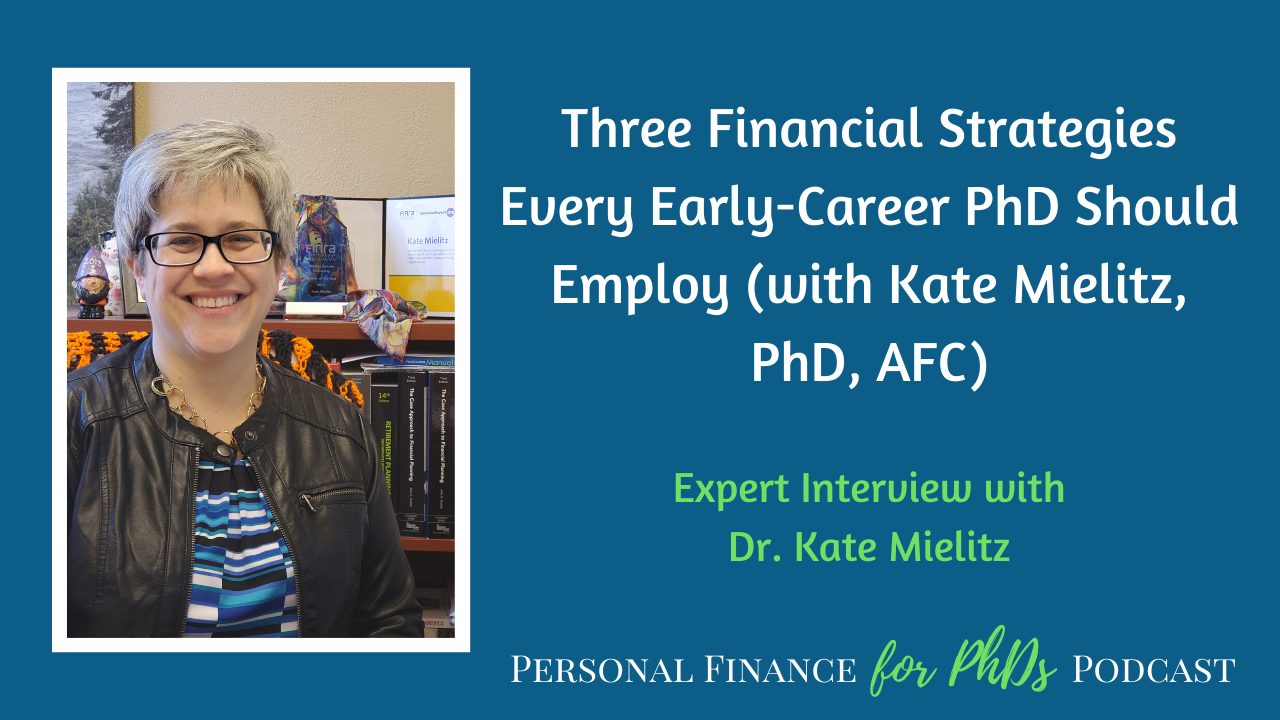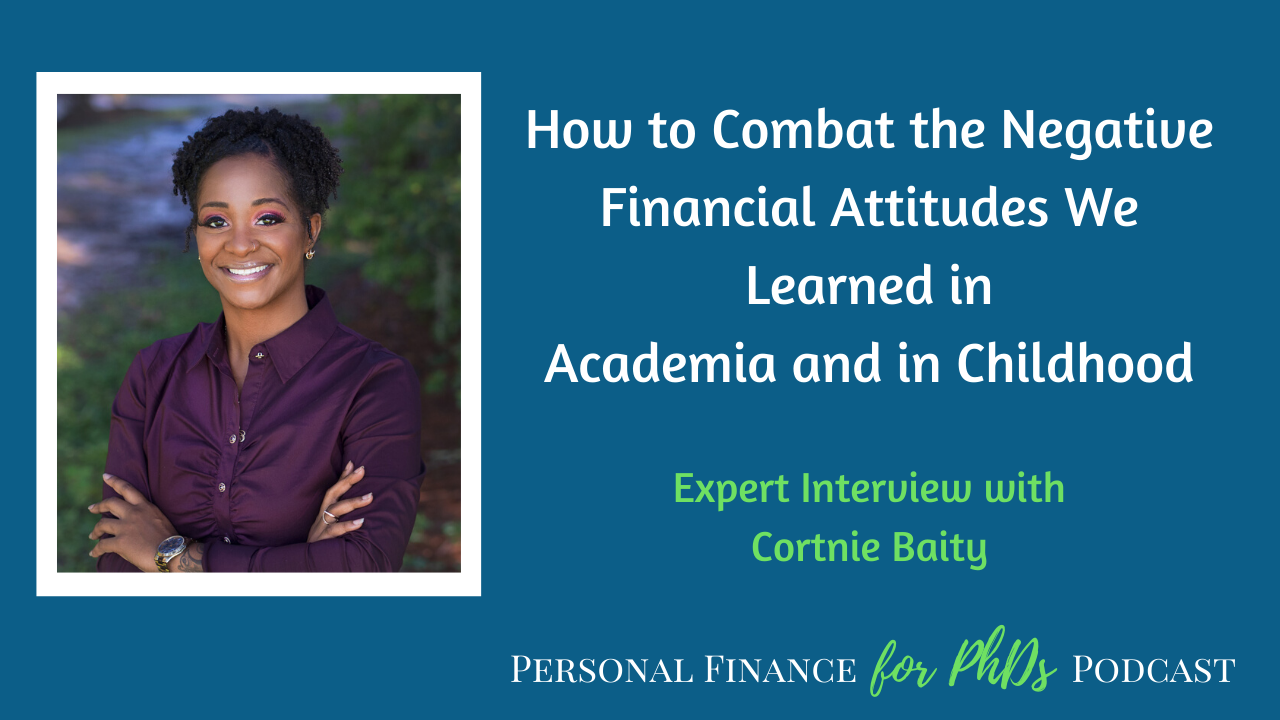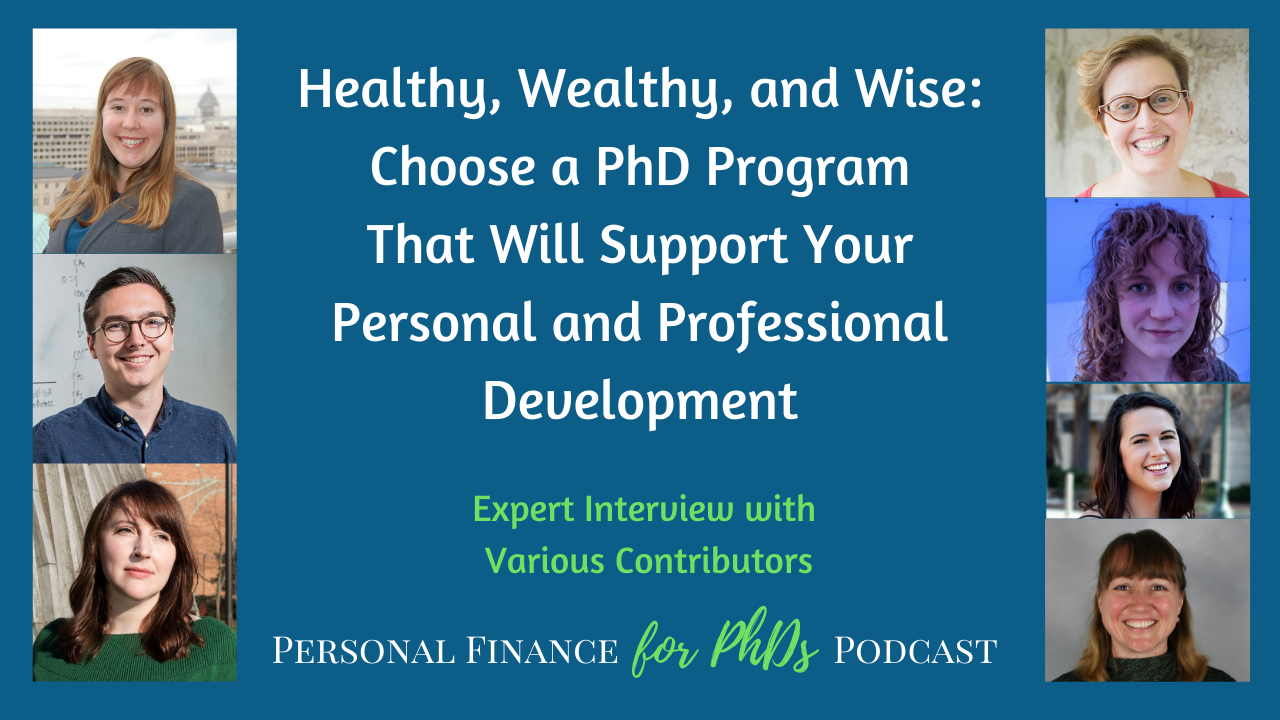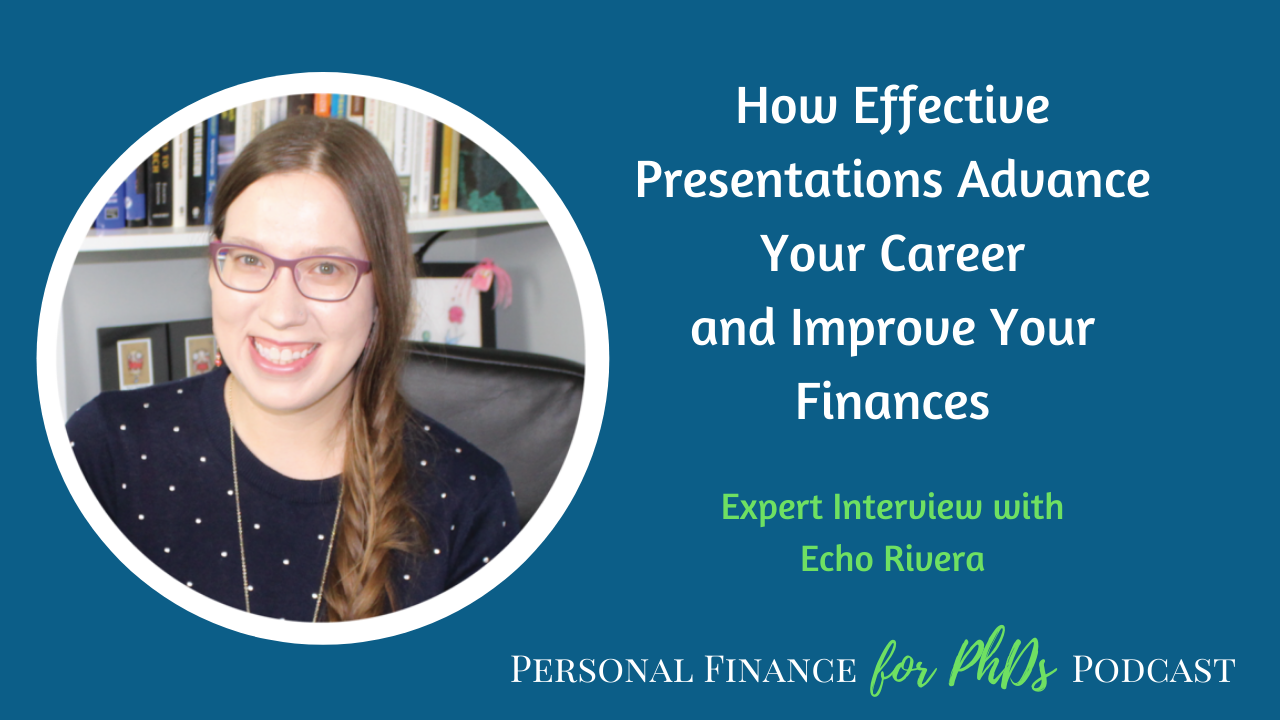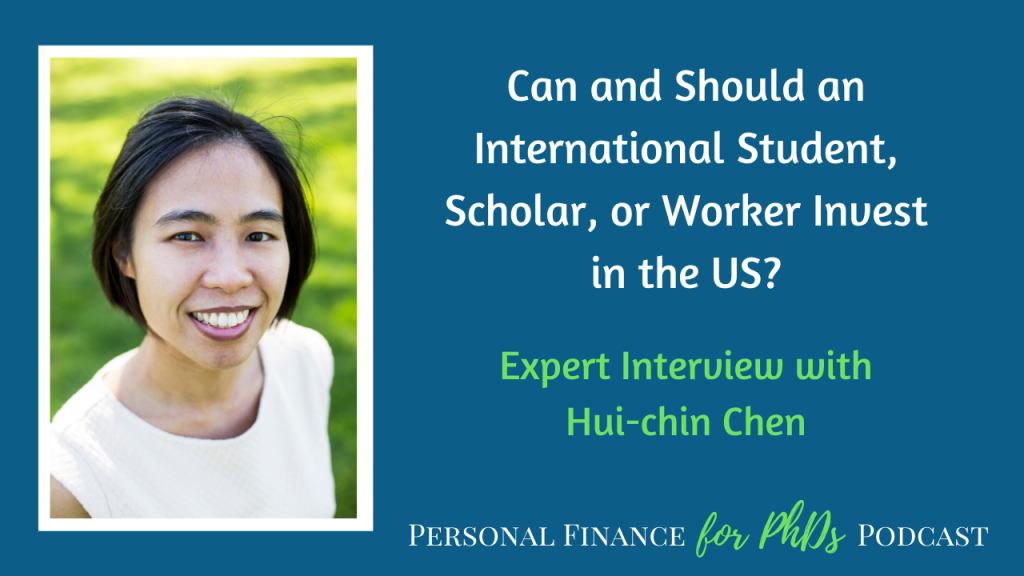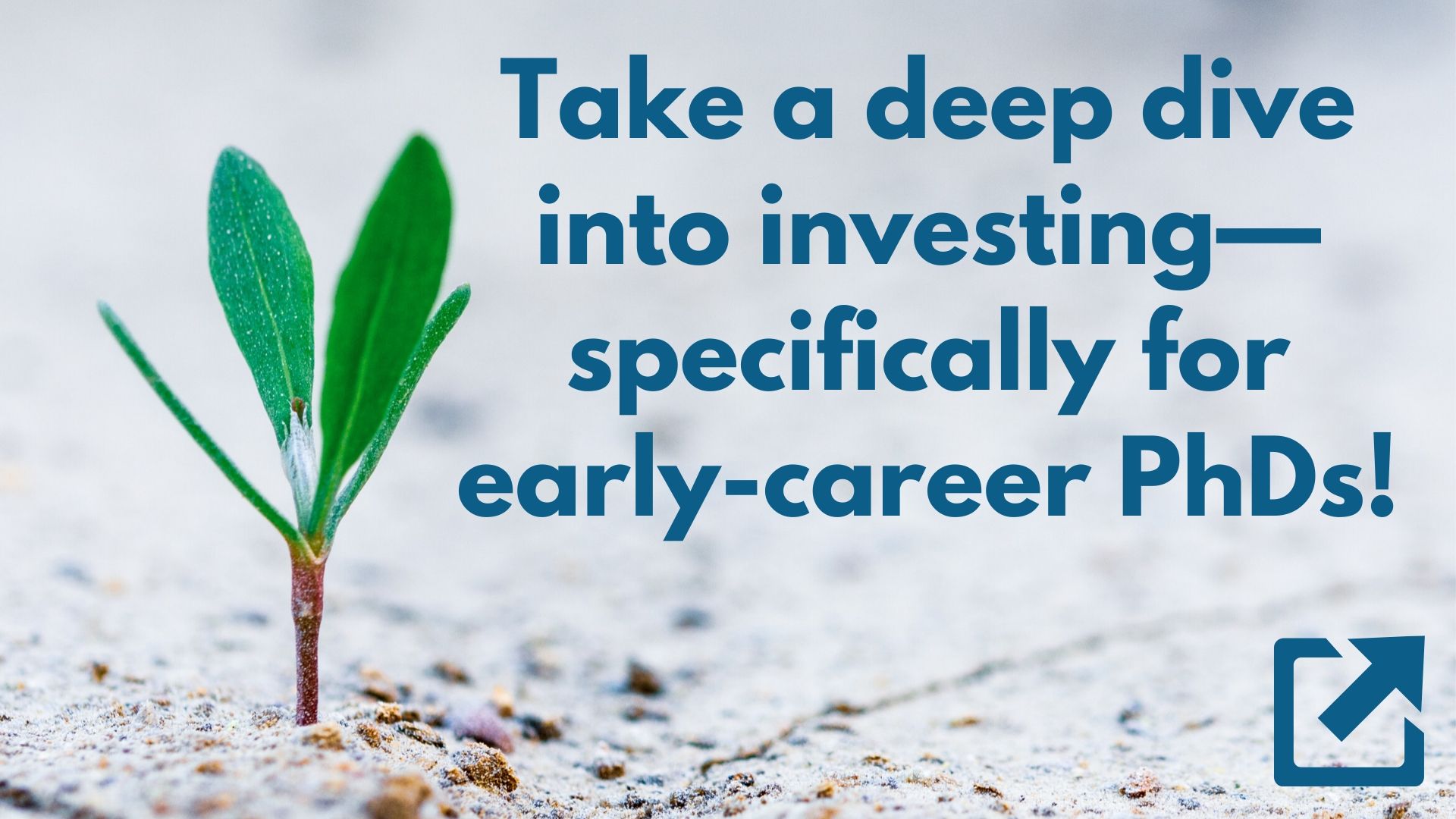In this episode, Emily interviews her brother, Sam Hogan, a mortgage originator with Prime Lending (Note: Sam now works at USA Mortgage) who specializes in PhDs and PhD students, particularly those receiving fellowship income. Sam relays what it takes to qualify for a mortgage in terms of credit score, income, and debt load, including the special way deferred student loans play into the calculation. He details the unusual strategies he has learned over the past year of working with PhD clients to help them get approved for mortgages, even with non-W-2 fellowship income. At the end of the interview, Sam shares why he loves working with PhD home buyers. Over the past year, Personal Finance for PhDs has referred so much business to Sam that he has become an advertiser on the podcast.
Links Mentioned
- Contact Sam Hogan via phone: (540) 478-5803; or email: [email protected]
- Listen to a previous episode with Sam Hogan: Purchasing a Home as a Graduate Student with Fellowship Income
- Related episode: “This Grad Student Defrayed His Housing Costs By Renting Rooms to His Peers”
- Personal Finance for PhDs: Financial Coaching
- Personal Finance for PhDs: Podcast Hub
- Personal Finance for PhDs: Subscribe to the mailing list
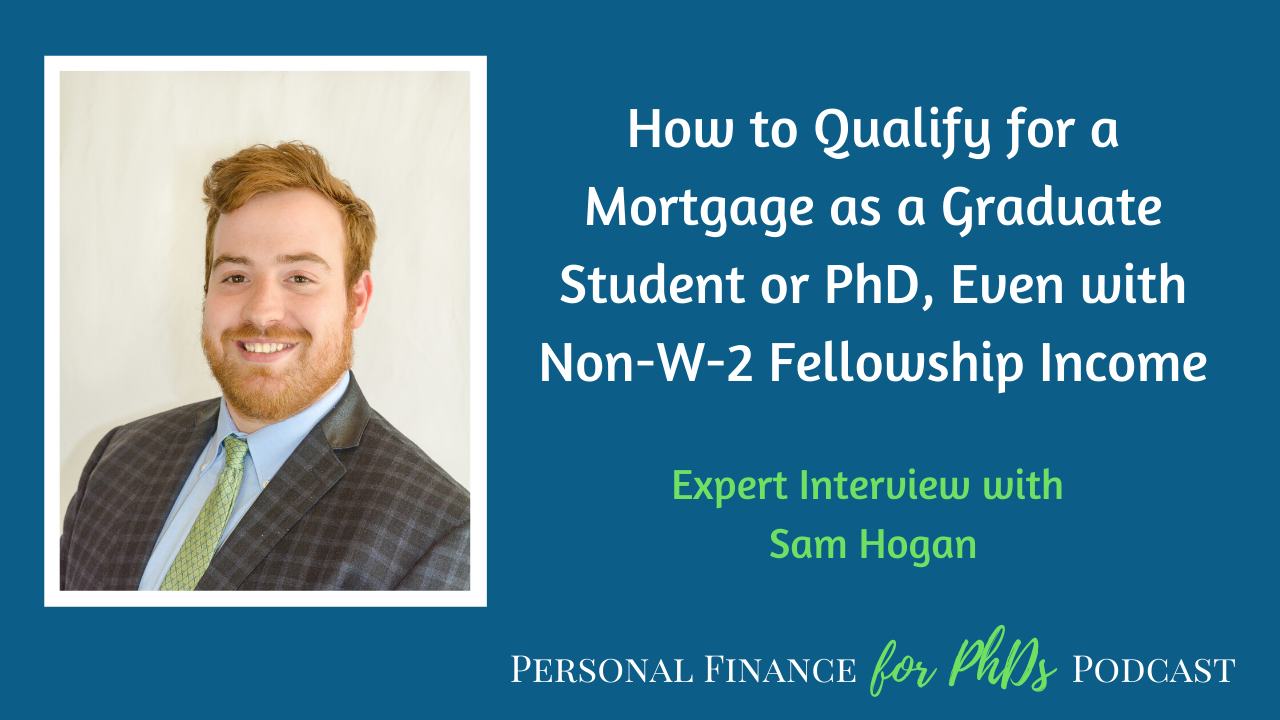
Teaser
00:00 Sam: It’s always best for a PhD student to be as proactive as possible. I’ve seen letters with three years of continuance, but they’ve reached out to me after one semester has passed. Now they only have two and a half years of continuance, where someone, if they had reached out a year earlier about their future, and how they’re planning to purchase home when they were in a new area, that is the perfect slam dunk way to do it.
Introduction
0:33 Emily: Welcome to the Personal Finance for PhDs podcast, a higher education in personal finance. I’m your host, Dr. Emily Roberts. This is Season 5, Episode 17. And today, my guest is Sam Hogan, a mortgage originator with Prime Lending (Note: Sam now works at Movement Mortgage) who specializes in PhDs and PhD students, particularly those receiving fellowship income. Sam relays what it takes to qualify for a mortgage in terms of credit score, and debt load, including the special way deferred student loans play into the calculation. Sam details the unusual strategies he has learned over the past year of working with PhD clients to help them get approved for mortgages, even with non-W-2 fellowship income. At the end of the interview, Sam shares why he loves working with PhD home-buyers. Over the past year, Personal Finance for PhDs has referred so much business to Sam that he has become an advertiser on the podcast. Without further ado, here’s my interview with my brother Sam Hogan.
Will You Please Introduce Yourself Further?
01:34 Emily: I’m welcoming back to the podcast today. My brother Sam Hogan, who is mortgage originator. He sells mortgages. And Sam was actually on the podcast before in Season Two, Episode Five. It was while we’re recording this on April 12, 2020 and he was last on about a year ago. At that time, we were talking about how someone with fellowship income can actually get a mortgage — non-W-2 fellowship income because tis is a tricky thing that we talked about in that episode. So now, as I said, it’s been a year since that time, Sam’s handled a lot more mortgages of this type and so he knows a lot more about this process now. So I thought we’d have him back on for an update, basically, and a little more background on getting a mortgage as a graduate student or postdoc or PhD. So, Sam, welcome back to the podcast. Thank you so much for coming back on. Will you please just tell the listeners a couple words about yourself?
02:28 Sam: Thank you for having me, Emily, and Happy Easter from the east coast. Yeah, I’ve been working with PhD students now pretty heavily over the last 12 months. The company I work for, Prime Lending (Note: Sam now works at Movement Mortgage), is licensed in all 50 states. I’ve had the opportunity to read, review, approve, sometimes deny, these special candidates while they’re looking for their options for home-ownership.
[Sam’s Nationwide Mortgage Licensing System and Registry number: 1491786]
Basics for First Time Home-Buyers
02:52 Emily: Thinking about someone who is probably probably a first time home-buyer doesn’t necessarily know a whole lot about the process of getting a mortgage, and of course is concerned maybe about their their income, and are they really going to qualify and all these factors — what are the factors that go into a mortgage application? And what are the the ranges, that would be acceptable for those different factors?
03:16 Sam: Okay, so generally speaking, we’re looking at a risk profile and the ability to repay. For the borrower, having a over 700 credit scores for conventional, now about over 640 or 660 for FHA loans.
Different Types of Home Loans
03:32 Emily: Okay, you just dropped the terms conventional and FHA — what’s the difference between those two?
03:37 Sam: Yeah, so FHA is your original first time homebuyer program. It’s backed by the government and it’s designed for everyone to qualify for it, if you have decent credit and decent income. Conventional is preferred because it’s going to have a lower monthly payment, and the private mortgage insurance will drop off automatically. You should have over 680 or higher credit scores to go conventional and the income ratios are a little tighter. So it’s the better loan to qualify for and it has better terms throughout the whole 30 years, or whatever your loan term is.
04:16 Emily: Okay, so FHA is a little bit easier to qualify for, because it’s sort of designed for first time home-buyers, but it’s a less preferable loan in the long term. And so if I remember correctly, a lot of people who have FHA loans for a while they then end up refinancing to a conventional type of loan a little bit later on, to get rid of that private mortgage insurance.
04:38 Sam: That is correct.
04:39 Emily: Okay, great. Okay, so going back to the the lending standards you just mentioned, like credit scores, what else goes into an application package?
04:49 Sam: Yeah, I want to just touch on our current world situation and the lending standards are changing right now. And they’re changing because everyone is in the same boat regarding a possible change or disruption in income, slowing income for a certain amount of time, so be sure to talk with an expert and their specific requirements because this will change from bank to mortgage company to a larger credit union or financial institution. These are uncertain times, so you’re going to have some fluctuation and differences from lender to lender, but you want to work just as we said before, you want to work with someone who’s keeping you in mind and your goals in mind.
How Credit Scores and Debt Impact Home Loans
05:32 Emily: Yeah, okay, great. I totally agree and we should re-emphasize that like we’re recording this in mid April, things could be different by the time we publish it, things could be different a couple months down the line, so definitely just talk with someone right away. You mentioned credit scores, but I know also, your income, of course, plays into how much of a mortgage you can qualify for. Can you talk about that a little bit?
05:53 Sam: The common rule of thumb is people will qualify for four to five times their annual income. Now that will depend also on how much debt they’re carrying, and how much they’re putting from their savings into downpayment. But that’s a pretty safe estimate. Some people who are completely debt free will qualify six times their annual income, up to. Something else lenders experience a lot is, um, people doing their own due diligence and crunching the numbers, but we have systems and practices that do this quickly, more accurately, and can give you better results, so I would say talk with someone early and have them do the work. And then after you get their feedback, run your numbers to double check and maybe have some questions for them. We want to be able to work for you, and there’s no obligation to just have a few conversations and have someone explore your options.
06:48 Emily: Yeah, that sounds good. How does that play into that because I know a lot of PhD students do have significant debt loads from maybe undergrad or a master’s degree or something like that. How does debt affect the package?
07:03 Sam: Debt is not bad. It’s good to have things on your credit that have positive history, whether that’s a student loan you’ve paid off or currently paying off, revolving credit cards. You will run into issues, if you have absolutely no debt or debt history. I strongly recommend everyone, even against their pride, get a credit card. Don’t exploit it but use it regularly, pay off regularly. You want to have established credit, especially for a young homebuyer, because they might not have the 10 or 15 years of other types or forms of debt that someone who’s in their 30s or 40s might have.
07:49 Emily: Yeah, I definitely agree with establishing a credit score and having a strong credit history. But I’m just wondering, you mentioned earlier about the size of the mortgage and how debt can affect that. Solet’s say there’s someone who’s holding a good amount of debt. Does that affect like the ratio of the amount of mortgage they can take out?
08:06 Sam: Absolutely. Let me put it in some simpler numbers. If you’re bringing in $3,000 a month, all your credit cards, new house payment, maybe your car payment or gym membership, all that cannot add up to more than $1500 dollars of your income, We take your gross income and if you’re over 50% of that debt ratio, that’s a “Hey, better luck next time.” Even better situation is to be under 43%. Under 43% of your monthly income to debt ratio, is what Freddie Mac and Fannie Mae require, currently. Now this could be used to change, sometimes annually, sometimes quicker than that, but under 43% and better is a very good place to be in.
08:55 Emily: That makes sense. Yeah, so the total amount of debt payments you can have per month is limited and the mortgage has to fit in. To be approved for a mortgage, it has to kind of fit in around those other debt obligations that you already have.
09:09 Sam: Correct.
09:09 Emily: Okay, yeah, that definitely gives us something to kind of get our hands around when someone’s deciding, like, is it even worthwhile for me to approach Sam or another lender about possibly applying for a mortgage? I know you said earlier, just ask, that’s the best thing to do, because you guys can run the numbers better than than we can outside of the industry. I had one more question about student loans, because while student loans are in deferment, how does that play into that 43% that you just said. Because if they don’t make payments, does that just like not count at all? Or how does that work?
09:43 Sam: This a very specific guideline detail that changes, just letting you know Emily, and for conventional loans, and FHA loans, it’s both different. A rule of thumb: if your student loans are in deferment, you have to take the remaining balances and calculate 1% of that, and we factor that into your debt to income ratio. So if you have $100,000 in student debt, and we’re about to calculate a potential thousand dollar payment, even though you’re not making payments on them, that could stop your deal. Okay, so brings me back to letting an expert look at it.
10:19 Sam: Also, sometimes when the lender pulls credit, the way the credit populates, it looks like they’re making payments on their student loans. But really, they’re in deferment, so all those payments have to be switched. This is why when people run the numbers themselves, they might think, “Oh, no, I can’t do it.” But lenders know what it takes to get it approved. And I did want to touch back on the debt to income, it’s best for people to know first that you want to be under 43%. If that’s 42.98%, that’s still two thumbs up. But as soon as you’re over the 43%, some of the loan terms can change and make it stricter for you to buy.
10:56 Emily: Gotcha. And I also want to emphasize that just because you qualify for a mortgage of a certain size, or just because your debt-to-income ratio fits onto that 42% or whatever, that doesn’t mean you have to buy a house that that’s expensive. So these standards are for the lending industry, they’re not necessarily the advisable thing on the personal finance side. So just keep that in mind. We’re talking about basically how to qualify, not whether this is a good idea for your finances overall to have that high of a, an amount of debt per month. I just want to add that in there from the personal finance side.
What If You Don’t Have a Typical Situation?
11:33 Emily: Okay, Sam, so thanks for running down those broad strokes criteria. If someone doesn’t meet one of these, is there any recourse? Is there anything else that can be done if they still want to go through with a purchase?
11:47 Sam: Don’t give up lenders in general, we’re in the process of approving loans. We’re not in the business of denying people we would be out of business. So try and try again, I would say, because I have had PhDs students who have finalized their transactions with me been denied by two other lenders. The tip I can give to some of these people exploring their options is be willing to over document things for any uncertainty the lender might have. If there’s some variables in your income, explain to them that “Hey, this is all under the same advisor. I’m working in different areas, different years, but it’s under the direct supervision of x and he can provide you a letter saying that I’m here for five years under his supervision and it’s common for students in my place to continue to receive their funding. Please let me know if you need any other confirmation from my supervisor.” But yeah, recourse I would just validate how good of a borrower you are: I have great credit. I have the downpayment. I have guaranteed funding.
12:52 Sam: And you always can strengthen a file with obviously a cosigner. You can have a non occupant co bar family member, even a friend, who also is hopefully in good credit standing and has income to cosign on the loan for you. That’s not a forever thing, you can refinance them off the loan. But what I’ve found out in my years in this business is, there’s always a way to make it work if you keep working at it. Some people run out of options, and while they’re in school, it’s a funky time in their life, but that doesn’t mean that you’re not going to be a homeowner in a year or two years.
13:33 Emily: Yeah, gotcha. I actually was thinking specifically about co-borrowers because that was another example that we had on the podcast. My interview with Matt Hotze, he bought a home in Durham, North Carolina when he was at Duke and he bought his first year there and he had his parents, or maybe one of his parents, as his co signers and that enabled him, because his income was, low — one graduate student stipend. He was able to get into a larger house than he would have qualified for on his own. He actually had a three bedroom house. And then he rented out two of the bedrooms. So he was able to house hack, had no problem paying the mortgage because he had reliable renters. And yeah, it all worked out really well for him. So he just needed that little bit of help at the beginning. His parents, very fortunately, were able to provide that to him, and it was kind of a rosy story after that point, but that’s what he had to do to qualify for the mortgage.
14:27 Sam: A cosigner, sometimes can solve everything, except for poor credit. But strength in numbers. You can have up to four people on conventional loan application. Have I done that ever? No. But is it possible? Yes. So yeah, I mean, if you’re having some difficulty, your loan officer, if you’re brainstorming with them, one of their first solutions is have a cosigner. A cosigner is a very simple fix. If you have to pivot your approval because you have gone through the process, you didn’t get approved on your own and your adding a cosigner on your contract, I would say give your lender about 10 days and you should be in good shape.
15:08 Emily: Gotcha. I’ll add in one more time. This is the “how to qualify for a mortgage” talk, not “is it a good idea to be a cosigner or to have a cosigner”. Totally separate conversation.
15:19 Sam: A client of mine that’s closing this month who listened to your podcast…I don’t want to reveal too much about his purchase, but we’ve been given the approval and at the start, we ran the numbers a few different ways. He was like “With a cosigner, what’s my payment? Without a cosigner how much is my cash to close?” And we were on the fence for a little bit but we were still in the process. So while he was under contract, I was still able to give him scenarios and options. We eventually decided with his deposits and everything that was already being credited, his cash to close was low enough that he wouldn’t need to have a cosigner. So it’s not set in stone at the start. Yes, it’s always better to have your ducks in a row. But the lender is flexible. We always can pivot for the buyers needs. And I also say that in the buyers defense. If something’s going wrong with the house, the lender can help you get out of the loan on your finance contingency, maybe if your home inspection is past. So there’s different ways we’re always here willing to help.
16:25 Emily: Yeah, that sounds really good.
Commercial
16:30 Emily: Hey, social distancers, Emily here. I hope you’re doing okay. It took a few weeks, but I think I have my bearings about me in my new normal. There is a lot of uncertainty and fear right now about our public and personal health and our economy. I would like to help you feel more secure in your personal finances and plan and prepare for whatever financial future may come. You can schedule a free 15 minute call with me at PFforPhDs.com/coaching to determine if financial coaching with me is right for you at this time, I hope you will reach out, if only to speak with someone new for a few minutes. Take care. Now back to our interview.
Tips for Home Loans with Non-W-2 Income
17:15 Emily: Okay, so let’s narrow down to the the scenario that we talked about the last time we did an interview, which is about a graduate student or postdoc with fellowship income, with non-W-2 income, and that a lot of lenders don’t understand how to deal with that. You’ve been working with these types of clients quite a bit over the last year. And so you have really figured out some things that how to make these loans work in some cases and what will not work in other cases and maybe in those cases, a co-borrower or something like that would be needed. Can you just tell me a little bit about, you know, this particular weirdness of non-W-2 fellowship income and how you make it work?
17:54 Sam: It’s definitely a tricky income. How I help make it work is I support all the variables within the fellowship income. I show that it’s the same field of study or field of work that they previously in. Especially in the offer letters, they usually always contain a phrase if the student remains in good standing, and the underwriter can say, well, that’s too much of a variable, we can’t accept this income because there’s too many variables. Well, I say well look at her transcripts, look at his transcripts. They’ve always been in good standing, literally forever. That’s why they were one of five students selected out of 400 applicants to get into this program. Yeah, it takes a little bit of storytelling, and the presentation is important, so it’s okay if someone who doesn’t have W-2 income, we treat other incomes just as fairly, but you have to know how to present it, how to over-document it, and if it’s too uncertain at the start, most lenders have a scenario desk you can reach out to who will give you some early feedback without going completely through the application process, completely through the loan process, and still having a little bit of a question mark about if you’re really approved. I’ve had our scenario desk, give me pushback on certain files, and I just asked, How can I support that variation or the uncertainty that you’re seeing in this letter because I can provide what you’re looking for most likely, I just need to know what that is.
19:38 Emily: Yeah. So I think if I can kind of zoom out from that a little bit. First of all, one of the things that you talked about in the last interview was that non-W-2 fellowship income is not going to qualify for an FHA loan. It’s just completely off the table. It’s only going to be a conventional loan. And what you’re talking about now is saying, okay, you know, PhD student or postdoc, you’re showing me your offer letter and you are looking for certain things that offer letter, like the income and also the number of years of guarantee, sometimes that’s in there as well. And then you’re saying, Okay, well for all the things in the offer letter that are maybe a question mark to the underwriter, you have now learned how to recognize some of those things, and you can start providing additional supportive documentation, that is asking the student or postdoc, okay, well send me your transcripts. Okay, well send me whatever it is, your work history. I don’t know what those things are. Can you talk a little bit about that guarantee? Because I know the guarantee is a very important factor when we’re talking about non-W-2 income.
Loan Types for Non-W-2 Income
20:41 Sam: Yes. So I want to answer your questions in the right order. One of the main critical points for this type of income is that it’s not recognized by the VA, Veterans Administration, FHA. It’s not recognized by USDA, and it’s not recognized by Fannie Mae. Your most successful application and loan approval is going to come from a Freddie Mac conventional loan, okay. Now you can do as little as 3% down for that conventional loan. But this is the key point that only Freddie Mac recognizes this income, per the lenders approval. Why these PhD students are not going to approved their first attempt with their lender is because it’s per the lenders approval, the lender can’t document it and approve it with their underwriter, then Freddie Mac will not take the loan.
21:40 Emily: So what you’re just saying there is that you now know having worked this type of income, this mortgage type is off the table. This mortgage type is off the table. This is the one that is potentially successful. And what you have to do is get your underwriters that you work with to approve that loan and then Freddie Mac will take it on, will approved it. What you have figured out is these little tricks and document support and so forth that need to happen for the underwriters that you work with, which presumably would be the same elsewhere, except they’re not necessarily as knowledgeable about this particular type of income.
The Importance of Offer Letters for Non-W-2 Income
22:15 Emily: Let’s talk more about that. I know that you’ve mentioned to me before, I think you mentioned in the last interview, that for this non-W-2 income, normally underwriters, lenders for W-2 income, they presume it’s going to continue for at least a while, even though we all know you can lose a job at any point. But for the fellowship income, they for some reason, don’t presume that it’s going to continue and they want to see a certain length of guaranteed fellowship time.
22:41 Sam: Yes. For conventional loans, we’re looking for three years of continuance of income. Now, I know it’s not fair because my job doesn’t guarantee me three years of employment in the future. That’s not the typical contract for all employment, its employment will usually. For conventional loans we want to see three years. I actually have a example that I’ve written up. It’s a mix of a few different approval letters that worked, that I had some success with clients in the past year. And I will say briefly that if your approval letter is more than three pages, there might be too many variables in your offer to get an approval.
23:36 Emily: You’re saying an offer letter, like the offer letter you get when you start grad school or start a postdoc position. This is going to be your stipend this along goes on for. This is a typical document, like instead of having a Form W-2, this is what a fellowship recipient would send to you. They would send you their offer letter and so what are you looking at in that offer letter that is like yeah, this is going to go forward or no, this might be a problem.
24:00 Sam: Yes, so what we’re looking for is the continuance of income, we want to have three years. We want it to state that you’re being provided health insurance, because that’s a really good sign shown you’re actually an employee, you’re not just a student. It’s okay for it to have a few variables in it, like remaining in good standing or making satisfactory progress towards their doctoral degree. That’s a good phrase in there, that’s fine. But when you have layers and layers of variables, like you know, making satisfactory progress towards our doctorate, you must take these courses or get this exact GPA or higher in these courses, must have approval from their supervisor for a continuance into a fifth year. Those are things I’ve had to get more information on because the more variables, the more uncertainty it makes the underwriter feel. And so that’s where it comes back to the presentation of the loan.
An Example of An Offer Letter
24:58 Sam: “I’m pleased to inform that you been awarded a fellowship in the first academic year beginning September 2019. In subsequent years, you’ll be supported by research and teaching assistantship. This Fellowship Award gives you deserved recognition for your accomplishments to date, as well as added independence to stipend and exploring your research interests for the first year. For the academic year 19-20, the stipend will be $3,345 for nine months. For Summer 2020, the stipend will be $3,475 for three months. This means you receive an annual stipend of $40,530. In addition, the award pays your tuition health insurance and health services fee. We are committed to continue this financial support for for up to five years, as long as you remain a PhD student in good academic standing.
25:51 Emily: Yeah, so what I’m hearing and I think what the listeners will hear is, that’s first year fellowship followed by W-2 income for the remainder, four years guaranteed.
26:02 Sam: Right.
26:03 Emily: That’s great. So that means in your world, that person would qualify for a mortgage during that first year, even though it’s fellowship, because their letter says, Yeah, it’s one year of fellowship, but you’re going to have after that this W-2 type income,
26:17 Sam: Correct. The most success I’ve seen with the PhD community are the simple letters that are less than two pages with little variable, that will show more than three years of continuance. And that’s a very simple approval for us.
26:35 Emily: And that’s whether that is fellowship income, or W-2 or a combination. If that’s what the offer letter says three years or more. That’s straightforward for you.
26:46 Sam: Correct. And that is where I’ve seen the most success with these doctoral candidates.
26:53 Emily: But still going back to your earlier point of if that’s not what a particular individuals letter looks like, still reach out to you, or another lender, because maybe with enough supplementary documentation, it could still go through, but it’s just going to be a little bit more of a process.
27:09 Sam: Correct. And, I mean, when I get connected with some of these department supervisors, I let them know, “Hey, this is what we’re looking for. Can you simplify this offer ladder for me, because we’re looking for something a little less complicated?” And I do like to tell my PhD applicants that, “Hey, I would love a shortened version of your personal statement. I want to be able to know a little bit more about where you’ve been, where you’re going.” And it always helps to tell a little bit of a story.
27:40 Emily: That is really interesting. That adds a little more detail to what you said earlier about the story and the presentation being what matters. That’s really interesting to me that you that you might include something like a version of a personal statement in this package that goes to the underwriter, that’s really interesting.
27:59 Sam: At the end of the day, I know I said this in the last episode, the last time I chirped in, but it does come down to one person’s decision. If the underwriter is comfortable, they’re going to approve you. If they’re not comfortable, they’re gonna want more documentation, or a cosigner, or something else to make it, you know, aboveboard.
28:20 Emily: Yeah, that clarifies. Thank you.
Final Words of Advice
28:23 Emily: Sam, is there anything else that you’ve learned about this fellowship type income that would be helpful to the listeners, with respect to getting approved for a mortgage?
28:32 Sam: I’ve learned that working with the PhD community are some of the best clients I’ve ever had.
28:38 Emily: Yeah, you’ve told me that before, and I really love to hear it!
28:42 Sam: Yeah. It’s really nice to work with people who are planning. It’s always best for a PhD student to be as proactive as possible. I’ve seen letters with three years of continuance, but they’ve reached out to me after one semester has passed, so now they only have two and a half years of continuanc, and that is a big problem. Whereas someone, if they have reached out a year earlier about their future, and how they’re planning to purchase a home when they were in a new area, that is the perfect slam dunk way to do it. Unfortunately, I’ve had to let some PhD students know that it’s not going to work out because their continuance, they’re under three years. And that’s going to be one of the major roadblocks. So talk to someone early, tell them you’re interested in a Freddie Mac, conventional loan. If they can find the right way to document their income and approve them. It’s happened more often in the last two months, I would say, with clients reaching out at this time of the year, when, if I had been talking to them six months ago, I could have had them approved.
29:52 Emily: Yeah, so actually at this time of the year, April 15 is decision day. Everyone has to decide what grad school they’re going to, or they’re supposed to decide. So if a PhD student is looking at that fellowship income in their offer letter, it says three years, they need to reach out to you sooner rather than later before that clock starts ticking, if they’re interested in purchasing within that first few months or first year or whatever, of being in graduate school. They need to reach out earlier. Thank you for saying that.
How To Reach Sam Hogan
30:21 Emily: Sam, you have not been particularly self promotional during this interview, and I appreciate that but I do want to say that you have been working with this type of client — people receiving fellowship income, also other types of PhD clients over the past year. I think you’re working really hard for them and that they should go to you, at least among getting a few different voices in their life, they should come to you. So will you please tell them the best way to contact you?
30:46 Sam: The best way to reach me is definitely by cell phone. Text is preferred right now because there’s a lot of volume going through the industry. My cell phone number is (540) 478-5803. And then my work email is a great line of communication, also. It’s [email protected].
31:15 Emily: Yeah. And we’ll have all that contact information in the show notes, as well. Sam just mentioned, I was surprised to learn, but even during this social distancing period, the mortgage industry is hopping, because interest rates are so low. People are really refinancing a lot right now, even if they’re not doing necessarily new purchases at the moment or not going into that process at the moment. But, you know, maybe in a few months or a year, whatever things will return to a more normal time and you’ll be able to move forward with lots more purchases.
31:47 Emily: Sam, thank you so much for coming on the podcast. And thank you so much for working with this population and being willing to, as a personal favor to me, to investigate this and take this on. I think it’s really fruitful and it’s been really great for my audience, so I really appreciate you
32:00 Sam: Thank you for having me on Emily. Always a pleasure to work with you and the PhD community. I’m just here to help, so if you need help text me, call me bother me on the weekend. It’s all good. I just want to make sure you all are seeing some success here while you’re getting your doctorates.
32:16 Emily: Excellent. Thank you, Sam.
Outtro
32:18 Emily: Listeners, thank you for joining me for this episode. PFforPhDs.com/podcast is the hub for the personal finance for PhDs podcast. There you can find links to all the episode show notes, and a form to volunteer to be interviewed. I’d love for you to check it out and get more involved. If you’ve been enjoying the podcast, please consider joining my mailing list for my behind the scenes commentary about each episode. Register at PFforPhDs.com/subscribe. See you in the next episode, and remember, you don’t have to have a PhD to succeed with personal finance, but it helps. The music is stages of awakening by Poddington Bear from the Free Music Archive and is shared under CC by NC podcast editing and show notes creation by Lourdes Bobbio.
